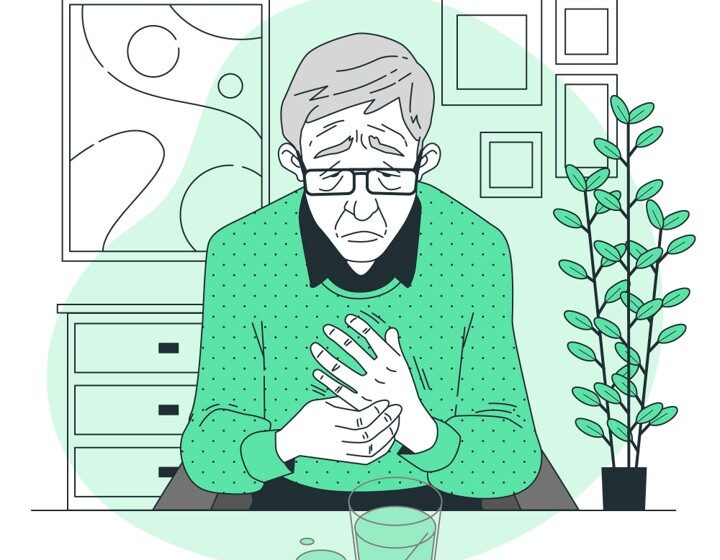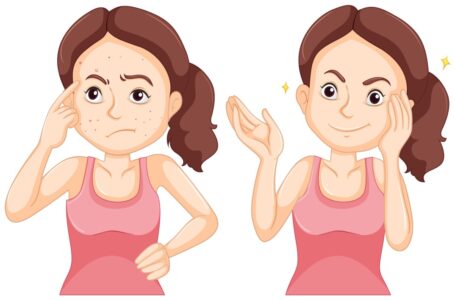Unfolding the Folds of Breast – World Breastfeeding Week 2021

Parkinson’s – Tremor That Terror and Homeopathy
Parkinson’s disease is a movement disorder that affects the nervous system. It is a progressive and degenerative disease which means it gets worsen with time and the situation cannot be reverse back.
It primarily affects the movement of body. Symptoms have a very gradual onset, often unnoticeable. It may start just with a little hand tremor but gets progress with time.
PATHOPHYSIOLOGY & CAUSE OF DISEASE: –
Nerve cell (neurons) of “substantia nigra” produced a chemical messenger in brain called as Dopamine. It is a Neurotransmitter that plays an important role in sending messages to the part of the brain that control movement and coordination. Smooth and coordinated muscle movements are possible due to the presence of Dopamine.
In Parkinson’s disease, nerve cells of substantia nigra that produces dopamine dies. As a result, dopamine level decreases which cause abnormal brain activity, leading to impaired movement and other symptoms.
The exact cause of disease is still unknown, but several factors appear to play a important role. These are as follows: –
- Genetic factor- these accounts for only 10-15% of cases. Most commonly involved are mutations in glucocerebrosidase, LRRK2, alpha- synuclein or parkin genes. Early age of onset of disease suggests involvement of genetic factor.
- Environmental factor- continuous exposure to toxins may increase the risk of Parkinson’s, but the risk is relatively small.
- Age- people usually develop the disease in old age, i.e. 60 or above. Young adults rarely experience this disease.
SYMPTOMS OF DISEASE: –

The most important symptoms of disease are as follows: –
- TREMOR- It starts in the fingers/ thumbs and may affect arms, legs, feet, jaw and tongue. It usually presents at rest which diminished on action known as ‘resting tremor’. Another characteristic is, it is Pill rolling in nature, that means rubbing of thumb and forefinger back and forth.
- Slowness of movement (Bradykinesia)- Slowness in initiating or repeating movements, impaired fine movements like writing. Over time, it becomes difficult to conduct small task like taking a step, getting out of the chair, hair combing, fitting the buttons etc. It takes much time to perform daily living activities.
- Rigidity: – Muscles stiffness may occurs in any part of the body. Characteristics is ‘Cogwheel type’ rigidity mostly affects upper limb.
- Trouble with balance and coordination that can cause a person to drop things or fall over.
- Difficulty in performing unconscious movements like blinking, smiling etc
- Fixed facial expression due to changes in the nerve that control face muscles.
- A voice tremor or softer voice
Non motor symptoms may precede typical motor symptoms and includes:
- Depression or emotional change
- Difficulty in chewing, swallowing or speaking
- Trouble in sleeping
- Constipation
- Fatigue
- Skin problems
Mnenomic for Parkinson’s – MARD
M- mask like face
A- ataxia
R- resting tremors (pill rolling tremors)
D- dementia
The classical difference between Multiple Sclerosis (MS) tremors and Parkinson’s tremor is
MS is visually guided tremor (here cerebellum is affected) while
Parkinson’s is resting tremors (cerebellum not affected)
Mnenomic for Multiple Sclerosis- EVM
E- eyes= dancing eyes (nystagmus )
V- verbal = staccato speech
M- motor responses = visually guided tremors
STAGES OF PARKINSON’S DISEASE
- Stage 1: Minimal Symptoms, Usually Tremors, Symptoms usually don’t affect your daily routine
- Stage 2: Disease starts to affect whole body, Routine activities may take longer to complete
- Stage 3: Loss of balance and coordination, Routine activities may become difficult
- Stage 4: Nearly impossible to live on your own, Routine activities should not be performed alone
- Stage 5: Final & most severe stage, confined to bed, Dementia, confusion, and hallucinations begin
EXERCISE FOR THE MANAGEMENT OF PARKINSON’S DISEASE: –
Parkinson’s can be well managed with certain exercise and yoga along with medication. These provides physical and mental support to enhance the overall well-being and quality of life.
These are helpful to build strength, improving balance and coordination and help in the development of better posture.
- Physical exercises like single leg stand, wrist curls etc.
- Certain yoga poses like child’s pose, virbhadrasana etc
- Aerobic exercise
- Yoga
- Meditation
BIOLOGICAL CONFLICT ASSOCIATED WITH PARKINSON’S
Every word has its own consequence, similarly every thought has its own manifestation. Human body is a sum of mind and thought. Along with food and water, the emotion and thought, that he feeds to his mind, inculcate in his behavior.
Diseases are nothing just the reflection of internal derangement of mind and body. Parkinson’s is a slow progressive disease in which emotions plays a important role. Although the conflict depends on the main presenting symptom of the patient but in general view the conflict associated with this is “a feeling of being stuck” or “not being able to move”. This can be any distress associated with relationship, at workplace etc. The tremor of hand is mainly connected with a feeling of not being able to hold on to someone or hold someone back like a loved one who is leaving or dying. That feeling that stuck in the mind that I could have save him is always remains in the mind.
Prolonged conflict activity leads to muscle atrophy causing a “self- devaluation conflict”. When a person is stuck somewhere, whether its relationship or work, and he is unable to get out through it, slowly and steadily he got himself adjusted to this. Although he knows he is not valued there, he is losing control, everything is going out of his hand but he cannot do anything. This thought constantly haunts him and further reflected in loss of movement.
HOMOEOPATHIC THERAPEUTICS FOR PARKINSON’S DISEASE:-
Homoeopathy offers a wide number of medicines which not only check the disease progression but also improves the quality of life of patients. Homeopathy intends to heal the patients from within thus promising a effective results.
Some of the most indicated medicines are discussed below:
- Argentum Nitricum– Indicated for the weakness of lower extremities with trembling.
- Causticum– Indicated for progressive loss of muscular strength. Paralysis of single parts. Contracted tendons.
- Gelsemium Semipervirens– One of the very good remedy for the diseases of nervous origin. Complete relaxation and prostration of whole muscular system, with entire motor paralysis.
- Mercurius – Indicated for trembling extremities, especially hands. Great weakness and trembling from least exertion.
- Plumbum Metallicum– Indicated for the diseases of spinal origin. General or partial paralysis with great weakness. Muscular atrophy from sclerosis of spinal system.
- Zincum Metallicum– Most marked medicine for the incessant and violent fidgety feeling in feet or lower extremities.
Here are some general rubrics from the COMPLETE REPERTORY for Parkinson’s that can be combined with the personality of patient and its individual mental rubrics to reach the similimum.
- (Generalities) Trembling; Intention tremor
- (Generalities) Trembling; fatigue after
- (Generalities) Parkinson morbus
- (Generalities) Stiffness; rigidity
- (Extremities) Motions; slow motion
- (Mind) Sadness, Despondency, Depression, Melancholy
- (Mind) Anxiety
- (Mind) Dementia
- (Sleep) Restless; loss of sleep, from
- (Rectum) Constipation
- (Face) Chewing motion of jaw; Difficult
- (Throat) Swallowing; Difficult
- (Speech & Voice) Speech; Difficult
REFERANCES:-
- Harrison’s Principles of Internal Medicine 20th edition
- Davidson’s principles and Practice of medicine
- www.webmed.com
- Pocket Manual of Homoeopathic Materia Medica & Repertory by William Boericke
- German New Medicines: Skeletal muscles
- Complete Repertory by Roger Van Zandervoort
P.S.: Do share your feedback about the above content in the comment section. Also mention any particular topic you would like to know about.
Note: We at The Homeopath take our ethics very seriously. More information about it can be found at Disclaimer page of our website.





